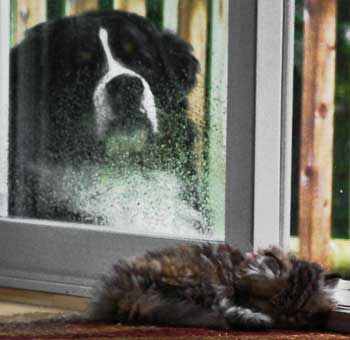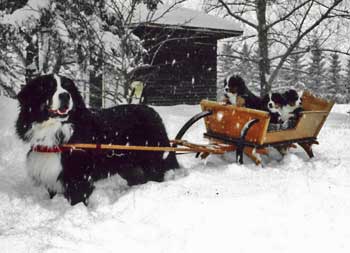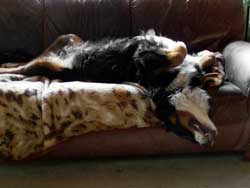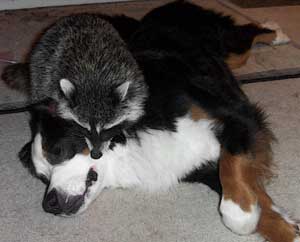Before buying a Bernese Mountain Dog...
Have you thought about these things?
Bernese are big, hairy dogs.
Male BMD's typically range in weight from 85 - 120 pounds; females from approximately 70 - 100 pounds.
Ask yourself...

- Does your schedule and lifestyle allow you to spend quality time with your dog?
**Considerations**
Before getting a Bernese ask yourself if you have a dog friendly lifestyle and are willing to spend quality time with your Berner so he or she has the best chance of remaining physically fit and content in your situation. Berners want to be where their people are. Any dog isolated from people and companionship will become bored and stressed. Many destructive, neurotic behaviors are a result of boredom and lack of exercise. When considering whether a Bernese Mountain Dog is a good choice for you, take into account that you will need to spend time teaching the dog manners and self control beginning at a young age so the dog acts appropriately at home and in public when the dog is grown. You will not be able to simply pick up an adult Bernese in your arms and keep it from harm or from harming others.
Some things you might want to consider in determining if you have enough time for a Berner follow.
· Do you have a small yard but lots of parks and time for outings?
· Do you work full time but can take the puppy or dog to work or have dog walker available?
· Do you have safe fenced area outdoors or a room inside the house to keep the dog in your absence?
· Is your lifestyle such that your dog can be with people and other animals more than not?
- Is your living situation "Berner friendly"? - Location might be important if you owned a Berner.
**Considerations**
Where you live will determine to some extent what types of activities you can provide for your dog. Berner owners should realize that in the past Bernese served as working farm dogs which provided the dogs with a stimulating environment. You may not live on a farm, but what will matter the most to your Bernese is how you manage your dog in your particular situation with the goal to maintain a workable and mutually rewarding relationship. Ask yourself if you are willing to make a commitment to provide your Berner with a happy medium of stimulating activity for his or her mind and body. Many Bernese owners today find fun working their dogs in obedience, drafting, tracking or herding.
- Can you provide a Berner with opportunities for exercise?
**Considerations**
 A common question puppy buyers ask is, how much exercise do Bernese need? Answer: Depends on the Berner. Several on leash walks per day or at least two 15 to 30 minute off leash play periods will provide
most adult Bernese with an outlet for their energy. For some this would not be adequate. Striking a balance between your lifestyle and schedule and the activity requirements of your dog at various stages of development is challenging to many owners. Bernese can be quite
active and energetic, but they are not likely to self exercise adequately in a yard alone. Some Berners are happiest when resting and need encouragement to get moving! By providing a Bernese with exercise that meets his
or her needs owners can expect to have a calmer, contented, healthier house pet. Playing 'Go fetch" is a great activity for some breeds of dogs - not so with most Berners. A typical Berner might chase a ball a couple of times, stand over the object and look at the owner who threw it
as if to say "See, I saw, I followed, I found it and aren't I smart".
No further action required!
A common question puppy buyers ask is, how much exercise do Bernese need? Answer: Depends on the Berner. Several on leash walks per day or at least two 15 to 30 minute off leash play periods will provide
most adult Bernese with an outlet for their energy. For some this would not be adequate. Striking a balance between your lifestyle and schedule and the activity requirements of your dog at various stages of development is challenging to many owners. Bernese can be quite
active and energetic, but they are not likely to self exercise adequately in a yard alone. Some Berners are happiest when resting and need encouragement to get moving! By providing a Bernese with exercise that meets his
or her needs owners can expect to have a calmer, contented, healthier house pet. Playing 'Go fetch" is a great activity for some breeds of dogs - not so with most Berners. A typical Berner might chase a ball a couple of times, stand over the object and look at the owner who threw it
as if to say "See, I saw, I followed, I found it and aren't I smart".
No further action required!
· What about exercising with other dogs?
Often owners believe another dog will serve as an exercise companion. Some dogs play well together, but some do not. Dogs roughhousing and playing together can be a great form of enjoyment and exercise. But supervision is required to prevent overly excited and exuberant dog pals from hurting each other.
- Would a Berner do well with your other pets?
**Considerations**
If you do not have other pets it will still be essential for you to train your dog to behave well around other animals should the dog be exposed to them in your community. The presence of other pets can be a source of positive mental stimulation for some dogs. As a single pet owner you may need to find ways to provide your dog with activities to compensate for time the dog will spend without the camaraderie that exists in mutiple pet households If you have other pets it is important to recognize that all pets in your home need to get along. Bernese generally tolerate other animals. Interactions should be monitored to make sure your Berner understands how to behave so as to not aggravate or injure other pets. Especially when Berners are puppies they can be quite boisterous. They can become curious and challenging to other pets. Some Bernese can be aggressive towards other dogs or cats if not taught how to behave appropriately towards them. Sometimes pets that do not get along present significant management problems to owners.
· What about Berners with cats, rabbits, guinea pigs, birds and other small pets?
Some Bernese have a strong prey instinct and so might chase smaller pets and potentially injure or kill them - it happens with some frequency.
NOTE: If you have other pets tell breeders you speak with about the nature of the pet so they can take that into account in helping to select a Berner puppy for you and potentially help you address any issues that arise in a multi-pet household.
 If owning a Healthy Berner is important
If owning a Healthy Berner is important
See The Big Health Picture
**Considerations**
Any dog, whether purebred or mixed heritage, can develop health problems. The genetic makeup of Bernese as well as environmental factors contribute to the quality of life any dog has the potential to live. As an owner you can positively influence health by providing your dog with an enriched existence including a carefully selected diet and an appropriate physical maintenance program.
By keeping stress factors to a minimum for your particular dog you will go even further to maintain health.
- Also see:
Berner Cost
Berners and Children